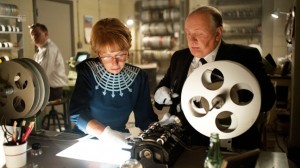My 10 Favorite Movies of 2012
I saw about 75 movies in 2012, and while I saw a couple dozen that I liked a great deal, very few movies about LGBT people or queer themes were given a wide release. And that is disappointing in general, but particularly for a critic writing for a paper called San Diego LGBT Weekly. This year, the many of the “serious” movies were less concerned with identity, sexual or otherwise, than they were with history, power, revenge, and the human costs of both well-meaning and ill-advised idealism. At the heart of Lincoln is the decision to prolong the relentlessly bloody Civil War in order to pass the 13th Amendment, and Zero Dark Thirty, the best movie officially released in 2012 (which opens in San Diego on January 11), is a disturbingly amoral depiction of the search and annihilation of Osama Bin Laden. Even the best Hollywood films intent of money making were darkly cynical; The Dark Knight Rises and Skyfall were exhilarating, but downers. (The Avengers and Pitch Perfect were exceptions, pretty good movies that didn’t reflect the world’s ennui.) And this means that some movies were finely, even brilliantly, crafted, but I didn’t enjoy watching them. What follows are not the 10 best movies of 2012, but rather my 10 favorite movies of 2012.
10. Hitchcock. Most assuredly, this movie is not a realistic depiction of actual events, but Anthony Hopkins does a hilarious and often poignant impersonation of the director and Helen Mirren, as his sarcastic and long-suffering wife, is subtle, arch, and sympathetic.
9. Magic Mike. Unfairly maligned for its subject matter – it’s about male strippers in Florida, after all – Magic Mike was still a Steven Soderbergh film: per usual, it was beautifully shot, tautly edited, and perfectly cast, particularly with Matthew McConaughey and Channing Tatum.
8. Bernie. A picturesque small town, a weird murder, bizarre and hilarious supporting characters, and a protagonist who is as gay as he is loved by the town’s little old ladies. It’s my favorite Richard Linklater film, and it is without a doubt the performance of Jack Black’s career.
7. Cabin in the Woods. Co-written by the great Joss Whedon, the film is scary, gory, and thrilling, as all horror movies should be, but it’s also ingeniously, surprisingly plotted and catch-your-breath funny.
6. Les Miserables. Russell Crowe is miscast and it’s too long, but Hugh Jackman, Eddie Redmayne, and especially Anne Hathaway make Tom Hooper’s adaptation of the great Broadway musical about love, pain, and grace in 19th century France a deeply emotional experience.
5. How to Survive a Plague. This documentary about ACT-UP and its off-shoot the Treatment Action Group features incredible found footage, insightful interviews, and a narrative that is moving, essential, and instructive.
4. Moonrise Kingdom. It’s ultimately a movie about a boy who runs away from camp to hang out with his girlfriend, but it is also a tone poem about childhood, parenting, wonder, and love. Some scenes are so beautiful they should be hung on the walls of a museum. Wes Anderson’s direction of his and Roman Coppola’s ingenious, intricately plotted script is a marvel.
3. Silver Linings Playbook. Again, David O. Russell has taken a standard genre structure – this time, the romantic comedy – and lifted it to high art with beautifully written, deeply nuanced characters and actors directed to their greatest performances. Bradley Cooper and Jennifer Lawrence are damaged and troubled, and watching them fall in love is redemption as entertainment.
2. The Master. Using the relationship between two men – Freddie Quell (Joaquin Phoenix), a restless, somewhat disturbed, somewhat animalistic drifter, and Lancaster Doss (Philip Seymour Hoffman), a charismatic, charming, and narcissistic metaphysicist — writer and director Paul Thomas Anderson explores what it means to be human, what it means to have control, and what it means to relate to other people. The resulting film is weird, disturbing, fascinating, entertaining, and profound.
1. Argo. Ben Affleck’s film about the insane plan the CIA devised (“This is the best bad idea we have”) to rescue six American embassy workers from Iran in 1980 is thrilling, funny, and nearly flawless. The merging of a satirical comedy about Hollywood, the paranoid suspense in Iran, and the wonkish, but often very funny drama of Washington, D.C. is seamlessly handled in Chris Terrio’s masterful script and Affleck’s direction of himself, his all-star cast, and the complex action sequences.
Honorably Mentioned: The Hobbit: An Unexpected Journey, The Sessions, Pitch Perfect, Brave, The Dark Knight Rises, Skyfall, The Avengers, The Intouchables
Note: I’ve left Zero Dark Thirty and Django Unchained off of both lists because while they are great works of art, they are so morally and politically upsetting that I almost wish I had never seen them.



